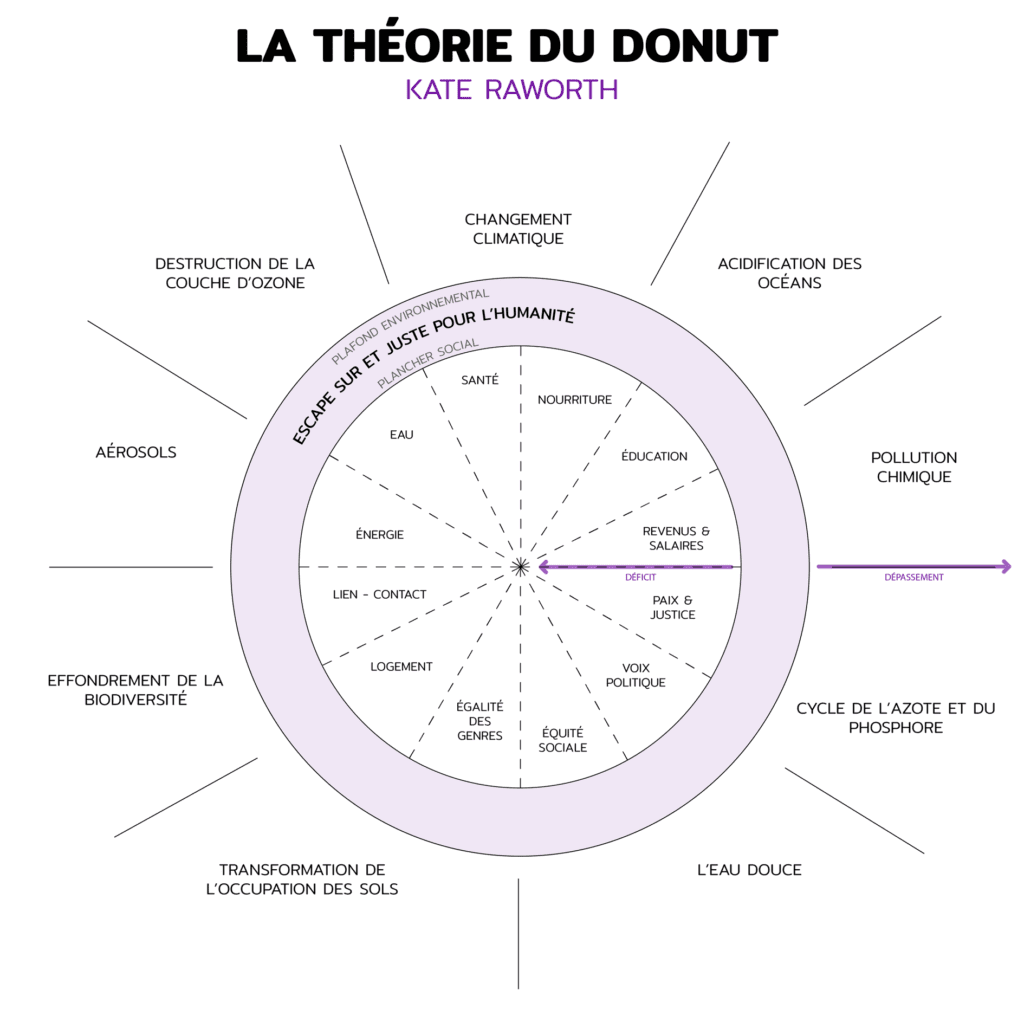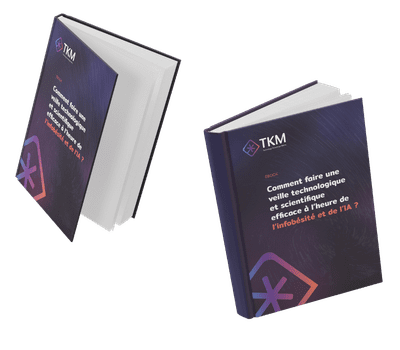Faced with current environmental and social challenges, TKM is initiating a transformation of its approach and aims to support, accompany and promote useful and responsible innovations.
Julie Lambert , Customer Experience Director at TKM, shares with us the concrete actions that the company is implementing to promote a sustainable economy, reduce its footprint and support its customers towards responsible and sustainable technologies.
Hello Julie! Could you start by introducing yourself and talking about your role at TKM?
Hello! My job as customer experience manager is to cover several aspects related to the image and positioning of the company, whether in terms of communication, marketing, but also and especially with regard to the design and ergonomics of our software platform.
My role is therefore to ensure that the overall experience of people using TKM is consistent and seamless , from the first interaction to the use of our platform and services. This also includes the onboarding and training of new employees who regularly join us.
My goal is therefore to support each person throughout our shared journey and to ensure that all our actions are aligned with our values, including our commitment to more responsible and sustainable innovation.
You are also a "Champion for the Planet" at TKM. How did that come about?
[Laughs] As an anecdote, during my job interview, Christophe Lecante, the president of TKM, asked me about the “Art Projects” section of my portfolio.
He seemed genuinely curious about these different activist and artistic projects, so I said to myself, "Come on, I'll give it my all" and I presented him with projects combining ecologies and feminisms, or even a poster for the anti-capitalist procession of the Grenoble Climate March. This commitment , which can be perceived as a little "radical" by some, has become a recurring joke between us.
But it was also on this occasion that we were able to share our desire to address the issues of corporate responsibility , particularly that of SMEs, in order to initiate an irreversible shift.
Is it from this curiosity and this common interest that TKM's responsible approach was born?
The TKM movement had already been initiated by Christophe. I think it was a result of a feeling of being caught between feelings of urgency on the one hand and helplessness on the other. Once this movement had been initiated, I was obviously very quick to join it. In March 2023 , we seized the opportunity offered to us by the launch of the Business Convention for Climate .
Moving forward collectively, with companies of all sizes and from all sectors on such complex paths, was a real opportunity that we wanted to seize and the decision was made in a few minutes.
Companies' participation in the CEC is based on a duo consisting of the manager and the person in charge of CSR issues, called " Planet Champion ." At TKM, we prefer the term " planet champion "... and that's me!
This marked our first formal initiatives in this area. It gave us momentum. This commitment is driven by a desire for comprehensive transformation : it touches not only on environmental issues, but also on social issues and even on the way we approach resource management by our teams and our partners.
We are aware that the climate and social challenges we face are complex and require a holistic approach . This is why we have structured our commitment around three main axes:
- reduce our impacts to their incompressible thresholds, that is to say degrade our environment and living things as little as possible,
- positive impact , that is to say improve and care for our environment through remediation actions at the territorial level,
- and make these issues accessible in the strategic decision-making and technological choices of our clients and develop ad hoc tools for this.
It seems important to me to emphasize that our approach, which considers global issues, is actually rooted in a position that is very closely linked to the territory because the solutions we imagine do not seem to us to be able to be separated from their environment and their territorial anchoring. We are talking here about respect for ecosystems but also the sovereignty of our species.
→ Read also – Start-up monitoring: an essential asset for mapping your innovation ecosystems and seizing opportunities
What do you mean by "making these issues accessible in decision-making"?
We are neither influencers nor a consulting firm! However, we are aware of our capacity for impact since we provide a monitoring and analysis platform that is used to help make strategic decisions.
We believe that our role will increasingly be to offer tools that facilitate technological choices while integrating environmental issues, resilience and respect for all components of our living ecosystems into this decision-making process.
To this end, we aim to develop solutions that will enable our customers, among other things, to assess the ecological impact of their innovations and technical choices (such as, for example, the choice of a material).
We hope to be able to open up new perspectives and to participate in raising awareness among all those involved in the R&D and innovation processes.
This could take the form of a tool that would allow us to visualize in advance the impacts of an innovation or the resources needed for its implementation.
Our ambition is to seek to broaden the horizon of possibilities and enable or encourage more responsible choices .
Can you detail the other aspects of your commitments?
Of course! The easiest line of action to initiate was internally and consisted of minimizing the environmental impact of our own operations.
First, we completed our first carbon footprint assessment (scopes 1, 2, and 3). It will serve as a benchmark to measure our progress in the coming years, and it will be regularly updated.
Regarding the choice of IT equipment, we have opted for a partnership with Commown eco-designed IT equipment for rental as part of a circular economy .
Let's be clear: this choice costs us significantly more than buying new. But it allows us to adopt an approach consistent with our ambitions and values, because this approach is more sober ; it allows us to reduce our dependence on an extractivist model while promoting new, collaborative and transparent narratives, particularly internally.
At the same time, we've implemented a series of internal training sessions for everyone who works or joins TKM. Each new recruit participates in a half-day dedicated to the knowledge we learned from the Climate Business Convention. We're also gradually allowing TKM teams to take part in the onboarding days offered twice a year by the CEC Alpes et Bassin Lyonnais.
We have also integrated the Climate Mural into our training and onboarding process. This allows everyone to better understand the interactions between human activities and climate change and to consider solutions in their daily lives, both professionally and personally.
We regularly try to share these kinds of topics, which can contribute to raising awareness. In one of our recent internal newsletters, for example, we presented (or recalled) Doughnut Theory , a model in the form of a doughnut that places essential human needs in tension with an ecological ceiling that corresponds to planetary boundaries.
Finally, on a more practical level, we try to regulate and manage the temperature of our premises responsibly. This ranges from limiting heating in winter and air conditioning in summer, to purchasing thermoregulating blinds or fleeces made from recycled fabrics for our teams, etc.

Does this change anything for your customers?
It's still a little early to talk about the impact on our customers, as environmental awareness in the industrial world is growing in line with business sectors. Some companies are already aware of these issues and see our approach as a real opportunity to integrate these issues into their R&D strategy. Others, however, are still focused on short-term economic survival issues and are therefore far removed from these topics.
But one day or another these subjects will come together, because technological innovation will have to enable companies, and before long, to increase their economic and geostrategic resilience.
However, we are very careful about how we communicate our commitment. We prefer to take concrete action , to implement tangible initiatives before communicating. We believe it is essential to move forward step by step, with rigor and honesty, rather than rushing into promising more than we can deliver.
What measures are you putting in place in terms of positive impact?
We are aware of the limitations inherent in our activity. Another of our objectives is to go beyond simply reducing environmental impacts. We are considering ways to have a positive impact on living things in general, that is, both human and non-human life.
For example, we support the Pays Voironnais football club because it is carrying out an ambitious project aimed at children and young people in the area where TKM was founded 20 years ago.
Another initiative, we participated in the financing of the organic takeover of the Vergers d'Hysope in Veyrins Thuellin by a young entrepreneur . This is a local initiative for organic farming which operates through direct and local sales, in AMAP and which integrates respect for local biodiversity in the plantations, the management of the spaces and the entire orchard.
We also support associations like Sylv'ACCTES , whose guiding principle is the preservation of the forest heritage of the territories.
However, we do not want to limit these actions to financial contributions. We would like to be able to anchor ourselves in other ways of helping and supporting, in a more sustainable , more engaging for the TKM team, particularly in our way of being in the world.
This work is still ongoing, and we are constantly seeking to clarify how to generate impacts that go beyond simple financial compensation. Ultimately, it seems essential to me to reflect on our collective imagination : we would like to imagine solutions that do not yet exist, to problems that are often perceived as insoluble.
This actually fits quite well with the DNA and history of TKM which, 20 years ago, invented a profession that didn't exist...!
What are the major challenges you face in implementing this sustainable commitment?
The main challenge is to move forward on a ridge line : between our awareness, our desires for movement on the one hand, and the link with the needs expressed by our customers on the other. Unfortunately, this is often contradictory.
Combining this ambition with economic reality is a daily challenge for an innovative company like TKM. Where to start? How to move forward based on convictions and intuitions without getting bogged down in misleading certainties? How to manage this innovation in an agile and responsive manner?
These are questions that may seem philosophical, but they are also very concrete. We are convinced that these investments and efforts will bear fruit, and we will proceed as TKM has always done: by co-developing its new solutions with its customers.
Approximately 80% of the innovations made to TKM's tools and services each year are the result of this partnership approach with our clients of all sizes and sectors. For responsible innovation issues, perhaps even more than for other topics, co-creation and collective intelligence seem to us to be the cornerstones of useful and viable solutions. These solutions will combine our clients' expertise in their fields with TKM's expertise in exploiting scientific literature.
Finally, there are the human and organizational challenges. Integrating a corporate culture focused on issues such as respect for the living, on collective subsistence mechanisms, no longer seeing growth as infinite when we know we're operating on a planet with finite resources...
All of this requires strong engagement and commitment from everyone within the team. We have initiated several collaborative workshops to discuss these topics with our colleagues and gather their ideas and suggestions on how we could improve.
co-construction process is essential to ensure everyone's involvement, but also to bring out fair and varied ideas and actions.
TKM's commitment is both ambitious and realistic. Through concrete actions, the company strives to reduce its ecological footprint while inspiring its customers to do the same. Want to learn more about TKM's sustainable commitment? Contact us !




